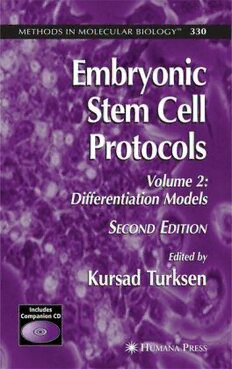Download Embryonic Stem Cell Protocols: Volume 2: Differentiation Models PDF Free - Full Version
Download Embryonic Stem Cell Protocols: Volume 2: Differentiation Models by Takashi Nakayama, Nobuo Inoue (auth.), Kursad Turksen (eds.) in PDF format completely FREE. No registration required, no payment needed. Get instant access to this valuable resource on PDFdrive.to!
About Embryonic Stem Cell Protocols: Volume 2: Differentiation Models
Drawing on the dramatically increasing research on embryonic stem (ES) cell biology and differentiation, Kursad Turksen has completely updated and expanded his highly acclaimed first edition of Embryonic Stem Cells: Methods and Protocols into two volumes. The second volume, Embryonic Stem Cell Protocols: Differentiation Models, Second Edition, covers state-of-the-art methods for deriving many types of differentiating cells from ES cells. A companion first volume, Embryonic Stem Cell Protocols: Isolation and Characterization, Second Edition, focuses on ES cells recently isolated from different nonhuman species, to provide a diverse collection of readily reproducible cellular and molecular protocols for the isolation, maintenance, and characterization of embryonic stem cells. The protocols follow the successful Methods in Molecular Biology™ series format, each offering step-by-step laboratory instructions, an introduction outlining the principles behind the technique, lists of the necessary equipment and reagents, and tips on troubleshooting and avoiding known pitfalls. Authoritative and cutting-edge, the two volumes of Embryonic Stem Cells illuminate for both novices and experts not only our current understanding of the biology of embryonic stem cells and their utility in normal tissue homeostasis and regenerative medicine applications, but also provide detailed accounts of the tools required for successful work in the area.
Detailed Information
| Author: | Takashi Nakayama, Nobuo Inoue (auth.), Kursad Turksen (eds.) |
|---|---|
| Publication Year: | 2006 |
| ISBN: | 1588294986 |
| Pages: | 480 |
| Language: | English |
| File Size: | 6.907 |
| Format: | |
| Price: | FREE |
Safe & Secure Download - No registration required
Why Choose PDFdrive for Your Free Embryonic Stem Cell Protocols: Volume 2: Differentiation Models Download?
- 100% Free: No hidden fees or subscriptions required for one book every day.
- No Registration: Immediate access is available without creating accounts for one book every day.
- Safe and Secure: Clean downloads without malware or viruses
- Multiple Formats: PDF, MOBI, Mpub,... optimized for all devices
- Educational Resource: Supporting knowledge sharing and learning
Frequently Asked Questions
Is it really free to download Embryonic Stem Cell Protocols: Volume 2: Differentiation Models PDF?
Yes, on https://PDFdrive.to you can download Embryonic Stem Cell Protocols: Volume 2: Differentiation Models by Takashi Nakayama, Nobuo Inoue (auth.), Kursad Turksen (eds.) completely free. We don't require any payment, subscription, or registration to access this PDF file. For 3 books every day.
How can I read Embryonic Stem Cell Protocols: Volume 2: Differentiation Models on my mobile device?
After downloading Embryonic Stem Cell Protocols: Volume 2: Differentiation Models PDF, you can open it with any PDF reader app on your phone or tablet. We recommend using Adobe Acrobat Reader, Apple Books, or Google Play Books for the best reading experience.
Is this the full version of Embryonic Stem Cell Protocols: Volume 2: Differentiation Models?
Yes, this is the complete PDF version of Embryonic Stem Cell Protocols: Volume 2: Differentiation Models by Takashi Nakayama, Nobuo Inoue (auth.), Kursad Turksen (eds.). You will be able to read the entire content as in the printed version without missing any pages.
Is it legal to download Embryonic Stem Cell Protocols: Volume 2: Differentiation Models PDF for free?
https://PDFdrive.to provides links to free educational resources available online. We do not store any files on our servers. Please be aware of copyright laws in your country before downloading.
The materials shared are intended for research, educational, and personal use in accordance with fair use principles.

